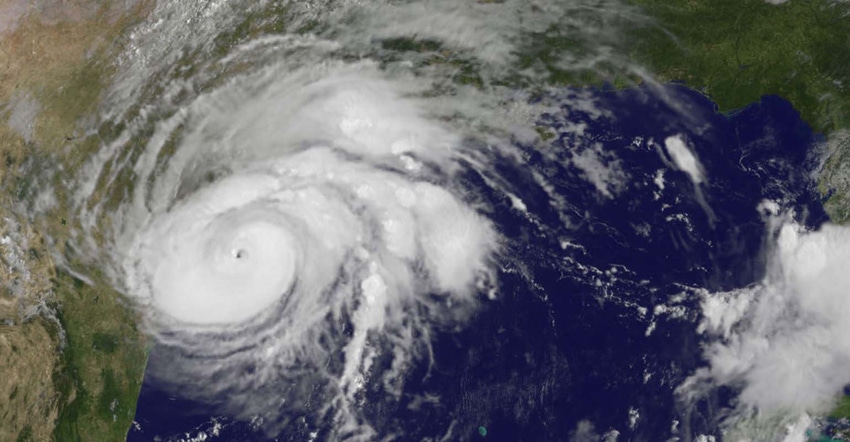
by Jen Skerritt and Brian K. Sullivan
Torrential rain from Hurricane Harvey is wreaking havoc on the largest U.S. cotton producer, hitting Texas at a time when many farmers are storing excess supplies on fields following a bumper harvest.
At least 100 cotton storage modules -- capable of holding 13 to 15 bales -- blew away near the community of Gregory, Texas, said Jeff McKamey, a farmer who owns a cotton gin that suffered minor damage when part of the piping and roof blew away. The area is just southwest of Rockport, Texas, where Hurricane Harvey made landfall on Friday.
The cotton that was not swept away by the storm may have suffered damage or be too wet to gin, according to McKamey. “We’ve had the most cotton ever in storage in the history of San Patricio County when the hurricane hit,” he said. “It’s just the worst possible time.”
The strongest storm to hit the U.S. since 2004 has since been downgraded to a tropical storm and is threatening to drop several feet of rain. Grain elevators suspended shipments earlier this week as port facilities braced for flooding, storm surges and possible power outages.
Flooding will disrupt wheat shipments through ports in Houston and Corpus Christi and impact grain elevators in the area, said Ben Scholz, chairman of the Texas Wheat Producers Board. While most of the state’s wheat-growing areas will not be impacted by the rain, cotton, soybean and corn producers further south will probably suffer damage, he said.
Further South
“The damage to crops is going to be further south and it’s going to be primarily cotton, soybeans and it could damage corn,” Scholz said Sunday by phone from Lavon, Texas.
Ports at the Texas Gulf account for about 24% of U.S. wheat exports, 3% of corn shipments and 2% of soybeans, according to the Soy Transportation Coalition, citing data from the U.S. Department of Agriculture.
The bigger threat to shipments of corn and soybeans, the top U.S. crops, comes from Harvey’s potential impact in Louisiana and the Gulf of Mexico. About 60% of American soybean exports depart from the region, as do 59% of corn shipments, said Mike Steenhoek, the group’s executive director.
The torrential rain will have a punitive effect on crop production and it will be while until grain elevators are back up and running, according to Steenhoek. “I think it will just futher extend the delays going out of the Texas Gulf,” he said Sunday in a telephone interview. “We’re going to hunker down and try to wait it out and once the weather permits to poke our heads up and assess what kind of damage has occurred.”
Cattle Threatened
The storm is also striking an area home to thousands of head of cattle. Texas A&M University’s AgriLife Extension Service is helping to set up animal sheltering sites around the state in case ranchers need to relocate cattle or other animals, said Andy Vestal, a professor and extension specialist. Some livestock owners closest to the coast have already been working to move animals to higher ground via trailers, away from low-lying areas and tributaries, he said.
Damage assessment is starting to assess the damage Sunday and the flooding “looks like a real challenge for livestock producers,” Vestal said. Teams will be available to deploy to distribute feed and portable water troughs, if necessary, Vestal said.
“We’ve never experienced 20 to 30 inches of rainfall in a 48-hour period,” Vestal said by phone from College Station, Texas.
Elsewhere in the state, agricultural producers unscathed by the worst of the storm are hoping to resume operations. Gulf Coast Cooperative, which has a grain elevator about 20 miles (32 kilometers) outside Corpus Christi, hopes to restart cotton ginning operations as early as Sunday, said general manager Chris Yaklin.
“We were spared right here,” Yaklin said Saturday by phone. “We didn’t lose power. We’re in good shape.”
To contact the reporters on this story: Jen Skerritt in Winnipeg at [email protected]; Brian K. Sullivan in Boston at [email protected]
To contact the editors responsible for this story: Millie Munshi at [email protected]
Reg Gale, Jeffrey Taylor
© 2017 Bloomberg L.P
About the Author(s)
You May Also Like




